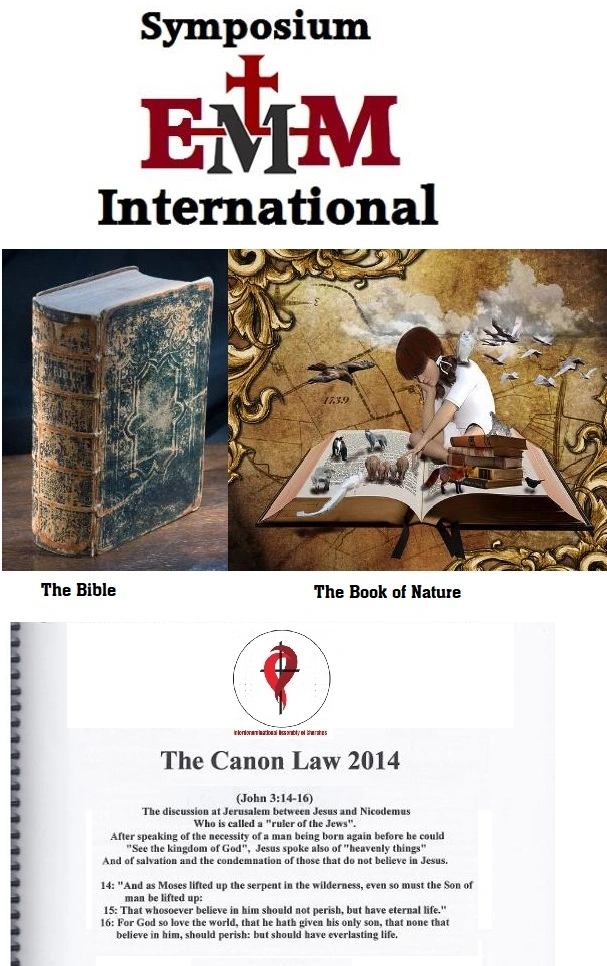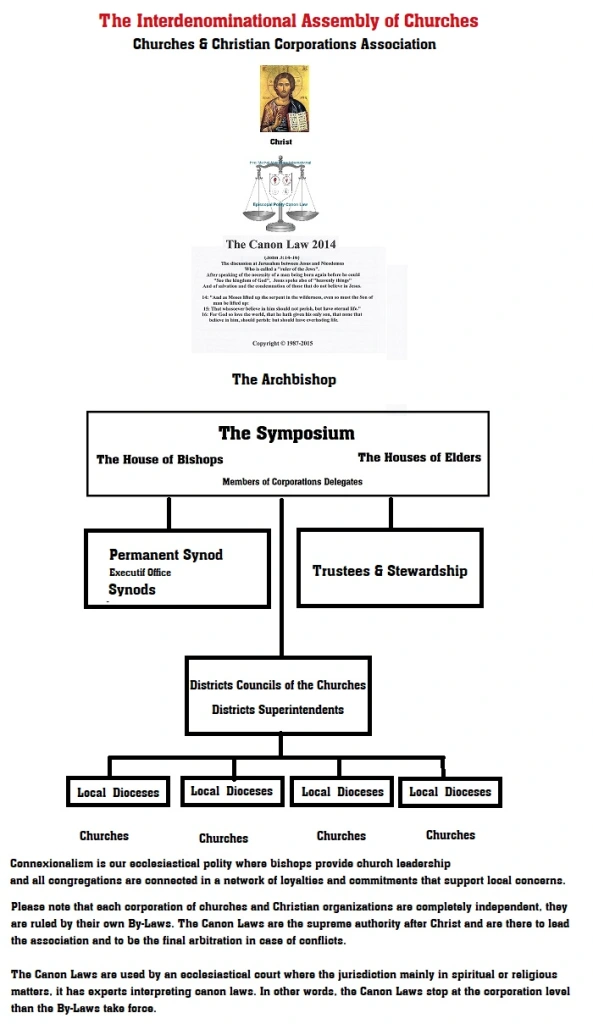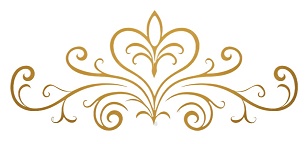
God gives us two (2) books:
- The Book of Scripture
- And the Book of Nature
Corporate Church Organisation and Governance
“The Christian Church defines “congregationalism” as “that form of Church polity which rests on the independence and autonomy of each local church.” According to this source, the principles of democracy in church government rest on the belief that Christ is the sole head of his church, the members are all priests unto God, and these units are regarded each as an outcrop and representative of the church universal.”
Churches organized with a congregational polity involved in associations of the Interdenominational Assembly of Churches which allow them to share common beliefs, cooperate in joint ministry efforts and regulate clergy with other congregations. Churches organized in our congregational polity generally disapprove of acknowledging authority in councils or other proceedings involving delegates or representatives from outside the local congregation. However, congregational polity does not prevent a local congregation’s leadership from adopting the decision or position of a council or other gathering like the Symposium.

The Church gives us The Laws
Elaborated from God’s Law
Note that the Canada Not-for-profit Corporations Act (S.C. 2009, c. 23) preceded all of our church laws Ref.: Canada Not-for-profit Corporations Act (S.C. 2009, c. 23)
Also, we have to take into consideration all partners country of origin oversee the local By-law.
THE SYMPOSIUM
Spiritual Government Of God
Christ
Archbishop
House of Bishops
Denominations
Local Ministry
Spiritual Leadership of Elders & Pastors
Worship
Teaching / Preaching
Group Ministries
Temporal Government Of Men
Christ
Archbishop
House of Elders
Districts
Local Board of Elders
Physical Leadership of Deacons & Servants
Area Ministries
Due to the association of churches the Ecclesiastical polity who is not the same for all, re: Churches having episcopal polity are governed by bishops. The Methodist and Wesleyan churches use a derivative of episcopalianism known as connexional polity. Presbyterian polity The Reformed churches are governed by a hierarchy of councils. The lowest level council governs a single local church and is called the session or consistory. Congregational polity retains the autonomy (lit. self-rule) of the local church.
Also we are faceting members around the world. When it is 15:00 hour in Quebec it is:
- in Nepal 2:00
- Burkina Faso 8:00
- India Andhra Pradesh 2:00
- Malawi 10:30
- Uganda 11:30
- Kenya 11:30
- Brazil 15:00
- Etc.
Adding the internet connection in the third world who suffer a lot, so our online meeting can take up of three weeks, we had no choice to have our General Assembly, the Synod and Council names to merge into one the Symposium.
The Symposium is for all our Christian Corporations Members and Clergy Members.

Synod

A synod is a council of a Christian denomination, usually convened to decide an issue of doctrine, administration or application. The word synod comes from the Ancient Greek σύνοδος (synodos) ‘assembly, meeting’; the term is analogous with the Latin word concilium ‘council’. Originally, synods were meetings of bishops, and the word is still used in that sense in Catholicism, Oriental Orthodoxy and Eastern Orthodoxy. In modern usage, the word often refers to the governing body of a particular church, whether its members are meeting or not. It is also sometimes used to refer to a church that is governed by a synod.
Sometimes the phrase “general synod” or “general council” refers to an ecumenical council. The word synod also refers to the standing council of high-ranking bishops governing some of the autocephalous Eastern Orthodox and Oriental Orthodox churches. Similarly, the day-to-day governance of patriarchal and major archiepiscopal Eastern Catholic Churches is entrusted to a permanent synod.
Synods of bishops are meetings of bishops within each autonomous Province and District and are the primary vehicle for the election of bishops and the establishment of inter-diocesan ecclesiastical laws.
The presence of clerical and lay delegates is for the purpose of discerning the consensus of the church on important matters; however, the bishops form an upper house of the sobor, and the laity cannot overrule their decisions.
In EMMI New Life Catholic, the Synod of Bishops is an authoritative meeting of bishops for the purpose of church administration in the areas of teaching (faith and morals) or governance (church discipline or law). However, in modern use, synod are applied to specific categories of such meetings and so do not really overlap. A synod generally meets every one years and is thus designated an “Ordinary General Assembly”. However, “Extraordinary” synods can be called to deal with specific situations.
While the words “synod” and “council” usually refer to a transitory meeting, the term “Synod of Bishops” or “Synod of the Bishops”, is also applied to a permanent body established as an advisory body of the Metropolitan Archbishop. It holds assemblies at which bishops and religious superiors, elected by bishops conferences or the Union of Superiors General or appointed by the Metropolitan Archbishop vote on proposals (“propositiones”) to present for the Metropolitan Archbishop’s consideration, and which in practice the Metropolitan Archbishop uses as the basis of “post-synodal apostolic exhortations” on the themes discussed. While an assembly of the Synod of Bishops thus expresses its collective wishes, it does not issue decrees, unless in certain cases the Metropolitan Archbishop authorizes it to do so, and even then an assembly’s decision requires ratification by the Metropolitan Archbishop. The Metropolitan Archbishop serves as president of an assembly or appoints the president, determines the agenda, and summons, suspends, and dissolves the assembly.
In the EMMI IAoC, Christianity Communion, synods are elected by clergy and laity. In most churches, there is a geographical hierarchy of synods, with General Synod is the Symposium at the top; bishops, clergy and laity meet as “houses” within the synod.House of Bishops and House of Elders.
